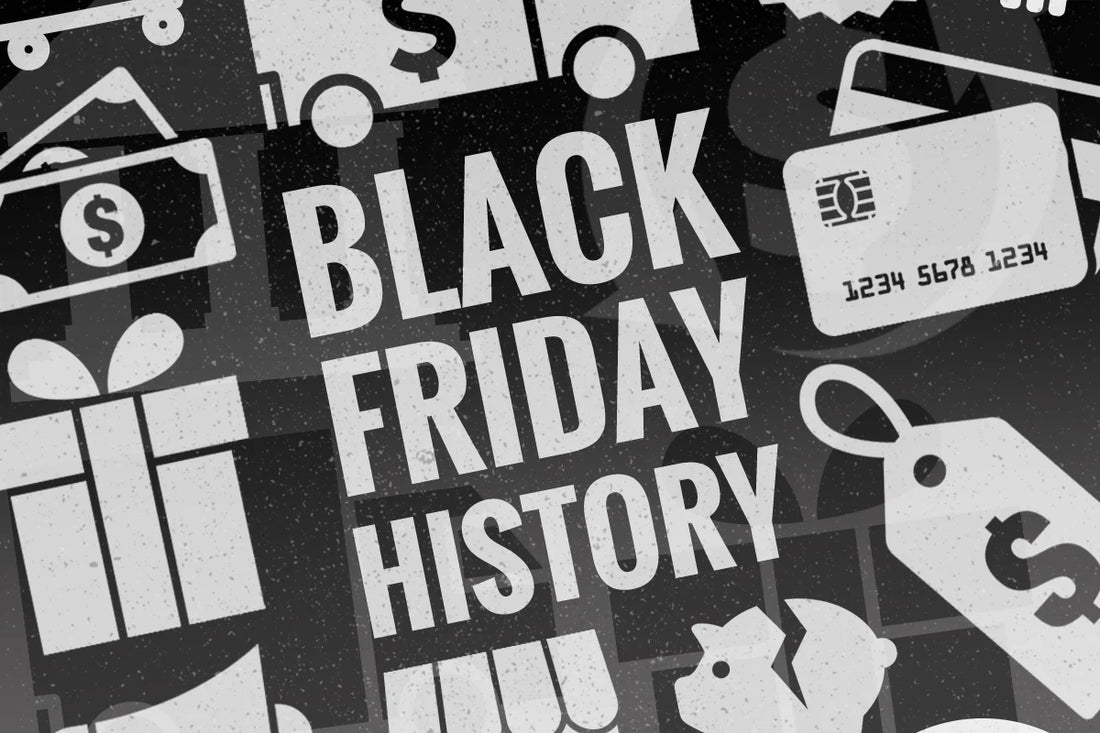
What’s the Real History of Black Friday?
Share
Black Friday, an annual shopping phenomenon that marks the beginning of the holiday shopping season, has evolved into a cultural and retail extravaganza. But where did this tradition originate, and how did it transform into the shopping spectacle we know today? In this blog post, we'll embark on a journey through time to uncover the fascinating origins of Black Friday.
The birth of the term
Contrary to popular belief, the term "Black Friday" did not initially have a positive connotation. Its origins can be traced back to the mid-20th century, where it was coined by Philadelphia police to describe the chaotic and congested streets on the day after Thanksgiving.
Police in Philadelphia complained about an influx of people coming to the city to shop the day after Thanksgiving, calling it a “Black Friday” because they had to control crowds. From there, the term was used to describe shopping on that day and gained momentum with each passing year.

Two notoriously ruthless Wall Street financiers, Jay Gould and Jim Fisk, worked together to buy up as much as they could of the nation’s gold, hoping to drive the price sky-high and sell it for astonishing profits. On that Friday in September, the conspiracy finally unraveled, sending the stock market into free-fall and bankrupting everyone from Wall Street barons to farmers.
In recent years, another myth has surfaced that gives a particularly ugly twist to the tradition, claiming that back in the 1800s Southern plantation owners could buy enslaved workers at a discount on the day after Thanksgiving. Though this version of Black Friday’s roots has understandably led some to call for a boycott of the retail holiday, it has no basis in fact.

Originally, retailers were upset about the name “Black Friday” because the term had a negative connotation, Koehn says. Efforts arose to call it “Big Friday” instead, but they ultimately failed. Retailers then changed the narrative and decided that Black Friday is when they’re supposed to be “in the black,” a financial phrase describing the profitability and prosperity of a business, in contrast to being “in the red,” or in a deficit.
As the decades passed, Black Friday underwent a significant transformation. Retailers recognized the potential to turn the day into a profitable opportunity, offering discounts and promotions to attract eager shoppers. The day became synonymous with incredible bargains and unbeatable deals, prompting retailers to move their financial ledgers from the red (losses) to the black (profits). Thus, the negative connotation associated with the term started to fade.
The evolution of tradition and consumer psychology
Black Friday's popularity grew beyond Philadelphia, spreading across the United States. Retailers began opening their doors earlier, and the day eventually became a shopping marathon starting at midnight or even Thanksgiving evening. The rise of online shopping further expanded the reach of Black Friday, with e-commerce platforms joining the frenzy with their own digital doorbusters.
Black Friday has become a psychological trigger for consumers, creating a sense of urgency and excitement. The limited time offers and doorbuster deals contribute to a phenomenon known as "FOMO" (Fear of Missing Out), driving people to participate in the shopping frenzy to secure the best deals.

Globalization of Black Friday
While Black Friday originated in the United States, its influence has transcended borders. Beyond the United States, Black Friday has gained traction internationally. Countries like Canada, the United Kingdom, Australia, and others have embraced the concept, adapting it to their own cultural and retail landscapes. The global reach of Black Friday is evident in the participation of both brick-and-mortar stores and online retailers worldwide.

Black Friday's popularity has led to the extension of the holiday shopping season. With retailers starting their promotions earlier in November and even October, the lines between Black Friday, Cyber Monday, and the holiday season as a whole have blurred, creating a more prolonged period․
The advent of smartphones and mobile apps has further revolutionized Black Friday. Consumers can now access deals on the go, compare prices, and make purchases with a few taps on their devices. Social media platforms also play a significant role, with retailers using these channels to promote deals and engage with their audience.
Conclusion
From its humble origins as a term coined by traffic-weary police officers to its current status as a worldwide shopping phenomenon, the journey of Black Friday is a fascinating tale of cultural evolution and retail innovation. As we navigate the hustle and bustle of this annual event, it's worth taking a moment to reflect on the history that brought us to this point and the continued impact of Black Friday on our holiday traditions.
Tutunjian Polo is also a part of this culture. On November 24 and during the weekend there will be mega discounts at Tutunjian Polo. Don't forget to visit our website at get your unique garments with huge discount.
Subscribe to our newsletter to ensure you don't miss out any special offers.
